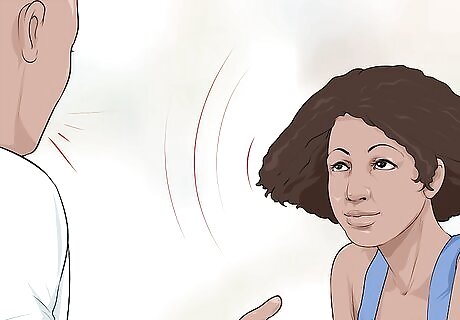
views
Avoiding Negative Interactions

Avoid unnecessary interactions with the irritating person. If it is an irritating co-worker, try not to have any discussions or interactions with them outside of the workplace, or about anything besides work-related topics. If it is a classmate or acquaintance, avoid sitting near the irritating person in class, or hanging out with them at casual functions. Don’t feel like you’re being rude by purposefully putting distance between yourself and the person who irritates you. Taking some space is perfectly normal, and it can help you avoid any negative interactions with the person. Don’t tell this person outright that you are avoiding them or that you are actively trying to put distance between you and this person. Just do it subtly and discreetly, and they will likely not even notice, and you will be less likely to end up dealing with further issues.

Discuss your issues with a third party. For example, if you are dealing with an irritating co-worker, talk to your boss about the issues you are having. Try your best to keep a calm and positive attitude while discussing your problems with this third party, especially if it your boss or supervisor. Don’t go to your boss or supervisor just to complain, vent, or in an attempt to get the irritating person reprimanded. You might approach your boss by calmly saying, “I really appreciate you taking the time to meet with me and discuss some issues I’ve been having. I had some things I wanted to bring to your attention and get some feedback on how to deal with them.” If you don’t have an authority figure to report to with issues, just go to a friend. Talking to someone outside of the situation can help you get things off your chest, and you might be less likely to explode later on when interacting with the person who is irritating you.

Control your reactions. Even if you can’t fully avoid all interactions with the irritating person, the important thing is that you control your reactions to their behavior so you avoid sparking more problems by losing your temper. Even if you feel angry or irritated, try to smile and let it roll off of your shoulders. Rather than focusing in on the things that person is doing to irritate you, focus in on how you are reacting to those irritating things. If you work on remaining calm through times of irritation and stress, you will start to be less likely to even feel the need to react to these behaviors at all, since they will eventually no longer cause an annoyed reaction from you. Whatever you do, avoid lashing out at the person. Consider the fact that if you react poorly and lose your temper at this person, it will only reflect badly on you.
Keeping Social Interactions Positive

Be polite. Smile and keep things cordial and kind with the person, even if they are not doing the same in return, and even if you are finding it difficult to do so. Changing your behavior and the way you interact with this person might cause them to change the way they interact with you, in return. You don’t have to go out of your way to be polite for this person. If they approach you and begin a conversation, just be polite in response. Condition yourself to keep your interactions with this irritating person as positive as you can, and you might start to feel less annoyed by these interactions as time goes on.

Avoid speaking negatively about the person when they are not around. Don’t speak to mutual friends, co-workers, or peers and express your negative feelings towards this person. Not only is it likely that your negative words will circle back around to that person, but you will also run the risk of that gossip reflecting negatively on you as a person. Even if someone truly irritates and frustrates you, don’t use that as an excuse to bad mouth them to anyone who will listen. That person’s irritating qualities might only be irritating to you, and not to everyone else. You might come off looking petty or foolish for shaming that person over those behaviors.

Take a deep breath and remain calm. If this irritating person says something to set you off, your instinct might be to lash out, or get angry at them. Just take a deep breath and stay calm. If this person is truly trying to annoy you, you will only disappoint them by not giving them the reaction they set out to receive. Even if the person has said something truly irritating or rude, laugh it off and move on with your day. Don’t stay in the situation or provoke further conversation. Stay calm and remove yourself politely from the situation. Say something like, “I’m sorry, I’ve got something really important I have to deal with, so I’ll catch up with you another time.”
Acknowledging the Real Issues

Take a moment of self-reflection. Sometimes, the things people find irritating about others are just the things they don’t like about themselves. Rather than immediately deciding to dislike this person, take a moment to reflect on yourself and decide why they seem to irritate you so much. Pinpointing the real source of the irritation and annoyance can actually help you gain some useful insight into yourself and your own feelings. Maybe this annoying person reminds you of someone else in your life, or they might even be forcing you to acknowledge things about yourself that you generally try to ignore. It’s not always easy to look to yourself when something is bothering you. It’s much easier to project and push the blame for these feelings outward. Take that extra time for introspection and identify where your negative feelings are really coming from.

Understand that there will always be people you don’t like very much. You can’t expect to get along perfectly well with every single human being you interact with. It’s human nature to have disagreements and differences from others. Acknowledge the fact that if everyone were the same, the world would be a pretty boring and one-dimensional place. There are plenty of instances where people choose to engage with seemingly annoying or irritating people and things—for instance, when people watch reality television and are entertained by others behaving in irritating ways. Even if you don’t realize it, most people appreciate that they are different from the people around them, and it’s easier to start appreciating those differences rather than being annoyed by them.

Know when to speak up, and when to let things slide. Even if you are putting distance between yourself and this person, or choosing to be polite even when they are rude, that doesn’t mean you need to be totally silent or allow yourself to be walked on. If someone is using you or taking advantage of your politeness, it is entirely within your right to speak up and let them know that their behavior is not acceptable. Giving constructive criticism or feedback to the person who irritates you isn’t the same as lashing out at them, or being blatantly hurtful. Calmly and respectfully approach them and say something like, “I have been feeling upset about the way you have been treating me. I’d really appreciate it if you could stop treating me that way.”

Avoid assuming things about the person’s motivations. Rather than immediately assuming the irritating person is out to get you and annoy you, take a moment to consider what might really be going on. The person may not even realize the way in which they are coming across to you. They might be dealing with personal issues, and those issues might be affecting their behavior. Try giving this person the benefit of the doubt—try to believe better things about other people, rather than going with the instinct of assuming they are purposefully trying to hurt or annoy you.



















Comments
0 comment